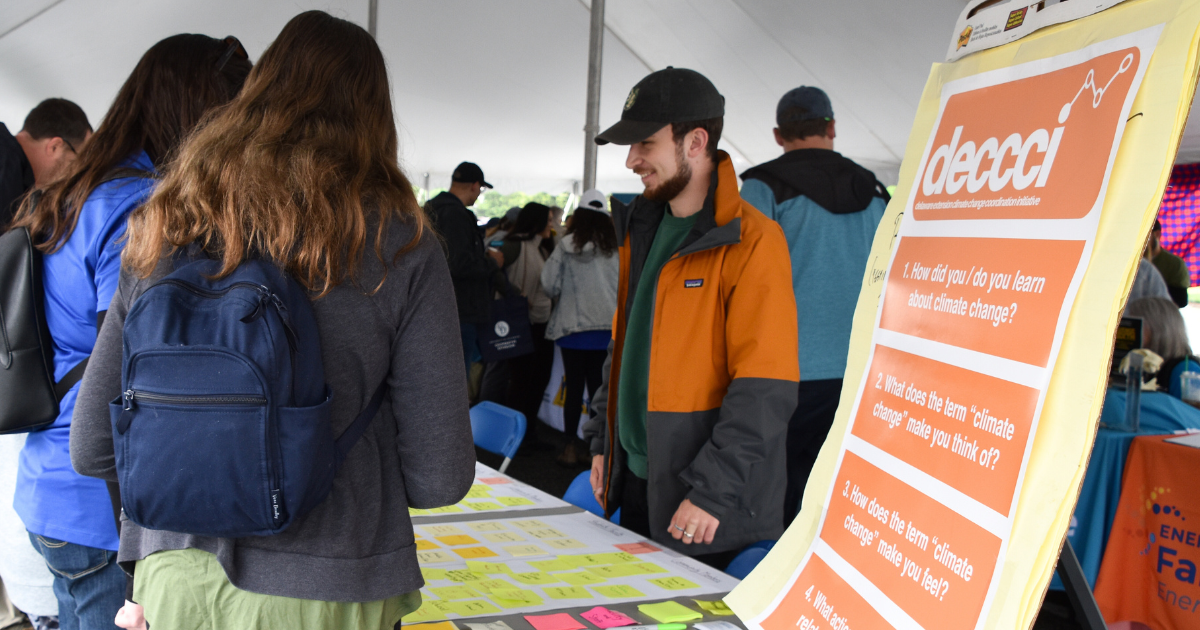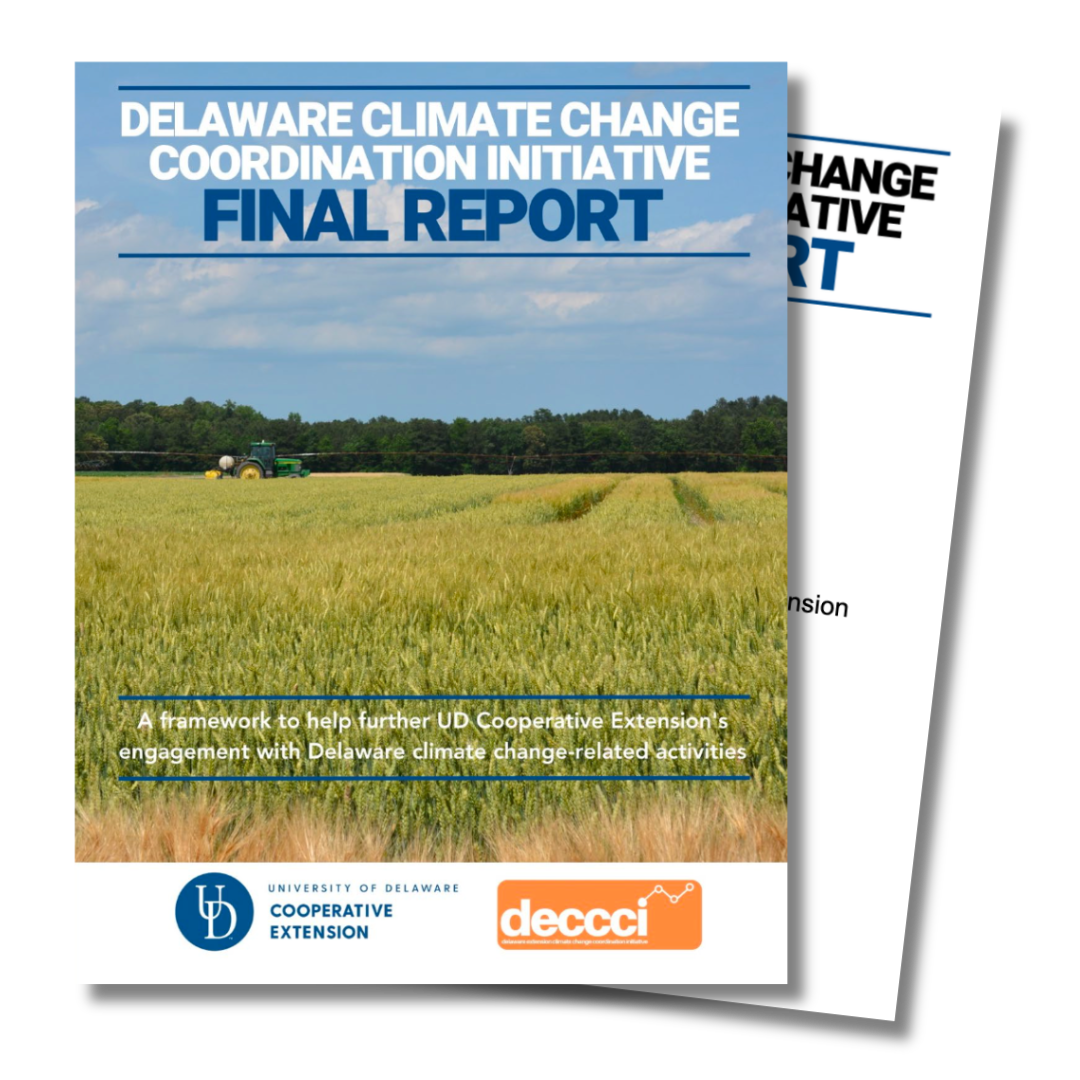
Delaware Climate Change Coordination Initiative (DECCCI)

Increasing information and knowledge about the current status of climate change related efforts within UD Cooperative Extension as connected to the larger University, region, state, counties, municipalities and communities.

Final Report
A framework to help further US Cooperative Extension's engagement with Delaware climate change related activities
Message from UD Extension Leadership Team
September 2023
Many thanks go out to Dr. Jerri Husch and her undergraduate scholar team of Wylie Feaster and Michelle Chavanne for their work on the Delaware Extension Climate Change Coordination Innitiative (DECCCI). In August, Jerri and the team submitted their final DECCCI report to the Leadership Team for their review and the report is now posted on our Staff Resources Page. This report summarized the findings of many one-on-one and small group conversations, polling, and document analysis across our organization and with our partners, stakeholders, and the public in Delaware. The report also makes recommendations for what and how UD Cooperative Extension can address climate change in the future. If you do not have the time to review the entire report, please review the executive summary of recommendations that follow. These recommendations range from incorporating climate change messaging into existing programs, enhancing the coverage of climate change topics and resources impacting all program areas on our website, and providing professional development to our personnel on how to best communicate on climate change topics. Based on these recommendations, the Leadership Team has collectively agreed to the following actions:
Create a cross-programmatic team of individuals whose work connects to climate change and can serve as champions for climate outreach
Working with our communications specialists, the team will create a story detailing UD Extension’s efforts and impacts on climate change by the end of 2024
Host a professional development training series this winter on climate science, climate communication skills, and resources available to our stakeholders to address climate impacts.
Anyone interested in serving on the climate champion team should reach out to Jenn by October 15th to express your interest!
DECCCI SUMMARY
August 2023
An assessment was conducted on University of Delaware (UD) Extension activities to address the impact of climate change. The assessment revealed several significant patterns and trends across different domains. The data collection, sorting, coding, and visualization processes identified four core content domains: education, policy, economy, and communication as key areas of focus.
Education: The assessment recognized a growing emphasis on climate change education at UD and universities globally. UD has established the Office of Sustainability and The Gerard J. Mangone Climate Change Science and Policy Hub. However, Extension agents and personnel involved in the assessment displayed limited engagement with the concept of "climate change." There is an apparent gap between the evolving role of UD Extension in climate change education and the awareness and utilization of the term "climate change" among its staff.
Policy: The state of Delaware has demonstrated commitment to climate action through initiatives like the Regional Greenhouse Gas Initiative (RGGI), renewable energy programs, and the establishment of a Climate Action Plan (CAP) for the state. Nonetheless, there is limited focus on these climate-related issues within UD Extension. Despite Delaware's engagement with climate policies, UD Extension seems disconnected from informing the development of state policies and lacks structured collaboration with state agencies regarding climate change. The assessment reveals a lack of familiarity with international climate policy materials and their implications on national US policies.
Economy: Although some UD Extension agents support clean and renewable energy initiatives, energy efficiency, transportation programs, and conservation programs for climate adaptation, their involvement with these efforts remains limited. Agriculture and aquaculture communities in Delaware receive federal funding and energy-saving programs, yet UD Extension's engagement in these climate change initiatives is constrained.
Communication: The domain of communication is recognized as a process that cuts across all content domains. Effective communication skills are vital for addressing the divide within UD Extension regarding the science and belief in climate change. The findings emphasize the need for improved communication to bridge differences in understanding physical mechanisms underlying climate change, recognizing its impact on ecosystems and agriculture, addressing diverse social, political, economic, religious, and scientific perspectives, and reconciling differences in mitigation and adaptation viewpoint
Conclusion
The assessment identified two primary areas of interest in understanding the impact of climate change on UD Extension activities: communication and education. There is a call to address the disparity within the organization regarding the acknowledgement and understanding of climate change. Key areas of potential conflict include understanding the science behind climate change, recognizing its ecological and agricultural consequences, navigating diverse perspectives, and finding common ground between mitigation and adaptation approaches. In addition, enhancing communication skills is crucial to foster collaboration and facilitate effective engagement with climate change-related issues across different content domains.
Recommendations and Future Action
The responsibility of UD Extension personnel is to act collaboratively to address climate change and ensure the well-being of Delaware citizens. Effective leadership and engagement in climate-related activities are essential for promoting positive change, supporting sustainability, and safeguarding the state's future. The recommended actions and future steps outlined in the assessment provide a comprehensive roadmap for UD Extension to play a significant role in addressing the challenges of climate change and fostering a more sustainable Delaware.
Recommendations:
The assessment identifies several recommendations for the University of Delaware (UD) Extension to enhance its engagement with climate change-related activities:
Education
Training and Integration: Provide climate change communication training to Extension personnel and integrate climate change language into outreach, education, and training materials.
Collaboration: Collaborate with local leaders in various sectors, such as schools, museums, and universities, to utilize arts, sports, leisure, and communication technologies for disseminating climate change adaptation and resilience strategies.
Bridge the Gap: Develop programs that bridge the gap between Extension and UD colleges, departments, and communities to foster collaboration and knowledge exchange.
Audience: Tailor educational efforts to diverse audiences, including individuals with varying opinions about climate change, and focus on practical problem-solving discussions.
Policy
Enhance Understanding: Increase Extension's understanding and support of climate change policies by enlisting experts and providing information about Delaware's climate change policies.
Role Clarification: Clarify the relationship between Extension activities and other Delaware stakeholder mitigation/adaptation activities through community climate conversations.
Collaboration: Collaborate with stakeholders to develop and implement effective climate change policies, advocating for policies that recognize cultural variations and equitable solutions.
Economy:
Emerging Economic Models: Introduce information about emerging economic models (green, blue, circular economies) and facilitate practical discussions about economic uncertainty and alternatives.
Workforce Development: Collaborate with relevant stakeholders to identify opportunities for green and sustainable economic growth and workforce development initiatives.
Future Action:
UD Extension's leadership role in responding to climate change involves several key steps:
Acknowledgment: Publicly acknowledge the reality of climate change and its impacts on Delaware's environment, economy, and communities.
Action Plans: Develop and implement comprehensive climate action plans with specific strategies for reducing greenhouse gas emissions, enhancing resilience, and promoting sustainable development.
Goals and Accountability: Set realistic, ambitious, and achievable climate goals, regularly review progress, and lead by example in promoting sustainability and energy efficiency.
Policy Engagement: Engage in the development of science-based climate policies and funding programs at the state and federal levels, collaborating with various stakeholders.
Community Engagement: Engage with stakeholders and communities to ensure climate action plans address diverse needs and concerns, while promoting renewable energy, resilience, and environmental education.
Our project aims to determine what role UD Cooperative Extension should have in addressing climate change throughout Delaware by creating a dynamic data repository sorted through a standard coding lens known as the AAAPT model. The categories that the lens uses to sort the data we collect include place (geographic location), actors (both individual people and organizations), actions (e.g., endorsements, webinars, programs, symposiums, etc.) and artifacts (e.g., news articles, reports, other documents, etc.).
About DECCCI
The newly established University of Delaware Cooperative Extension’s “Delaware Climate Change Coordination Initiative (DECCCI)” will increase information and knowledge about the current status of climate change related efforts within UD Cooperative Extension and as connected to the larger University, the region, the state and Delaware counties, municipalities and local communities.
Given the complex nature of climate change, clear and timely evidence and information is needed to inform and support UD Extension’s work with constituents and stakeholders in strategic planning and policy decisions that will focus, integrate, align and coordinate climate change response efforts in disaster management, disaster risk reduction and climate change adaptation.
Goals, Objectives, Activities and Outputs
The goals of DECCCI are to 1) research and 2) assess, current Cooperative Extension climate change adaptation related activities with respect to linkages and relationships with key Delaware (and other) stakeholders.
The objectives of the initiative are to identify current policies, programs, projects, procedures and practices, note gaps and recommend specific actions necessary for the formulation of comprehensive Cooperative Extension climate change adaptation plans. Key objectives are to:
- Coordinate climate change research and outreach activities within UD Cooperative Extension
- Identify existing activities through interviews and meetings with partners across the University, state, and region
- Identify organizational gaps in the area of climate change policy, programs and projects
- Prioritize recommendations to build capacity around climate change research and outreach efforts
- Identify and pursuing funding opportunities
Activities to support the achievement of DECCCI goals and objectives will include:
- Meet with Extension research and outreach Program Teams and personnel involved in these efforts
- Build Connections within the UD Community - Engage with the UD Climate Change Science and Policy Hub 2
- Build Connections within the State - Meet with state partners (USDA Natural Resource Conservation Service, Department of Agriculture, Department of Natural Resources and Environmental Control, conservation districts, local governments, agricultural industry and conservation organizations, etc.) to determine climate related needs that UD Extension could address through existing or new expertise
- Build Connections across the Region - Engage with the USDA Northeast Climate Hub to learn about regional efforts and connect our research and outreach efforts to those occurring across the region
- Build Connections at the National Level
- Participate in national climate related webinars to learn of others’ efforts and upcoming funding opportunities
- Identify and assess funding opportunities related to climate change research and outreach initiatives
- Facilitate educational/training activities on research, policies, strategies, programs and projects related to the global (local to international) climate change “ecosystem”.
Outputs
The systematic review, identification and visualization of climate change information relevant to University of Delaware Cooperative Extension and local, county and state will be transformed into a written report and visual infographics for ease of dissemination and sharing across diverse communities. This form of information communication will support the integration of climate change adaptation evidence, policies and activities into medium- to long-term policies, strategies and planning processes.
